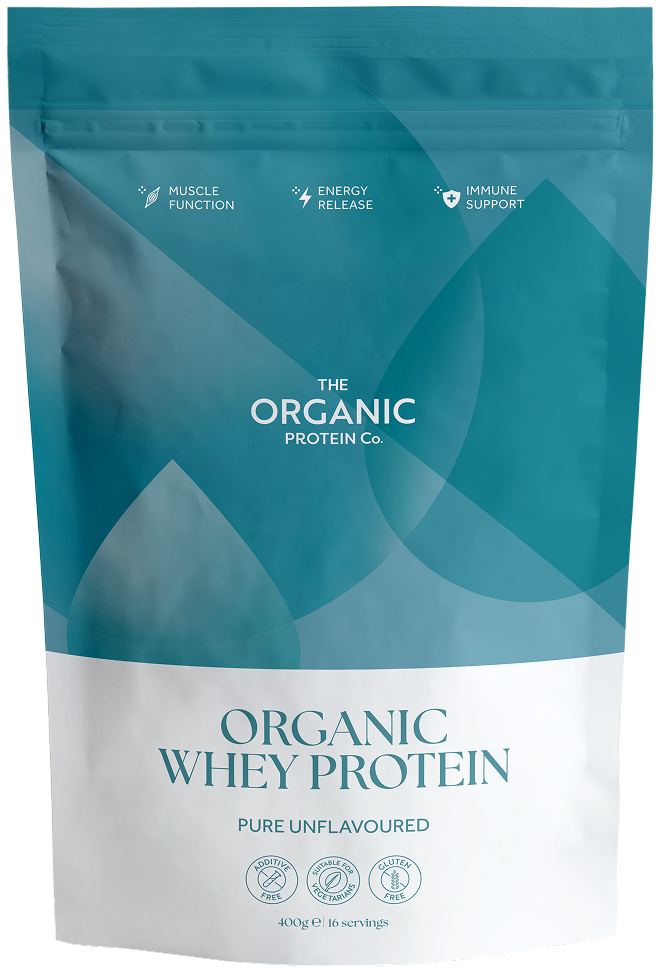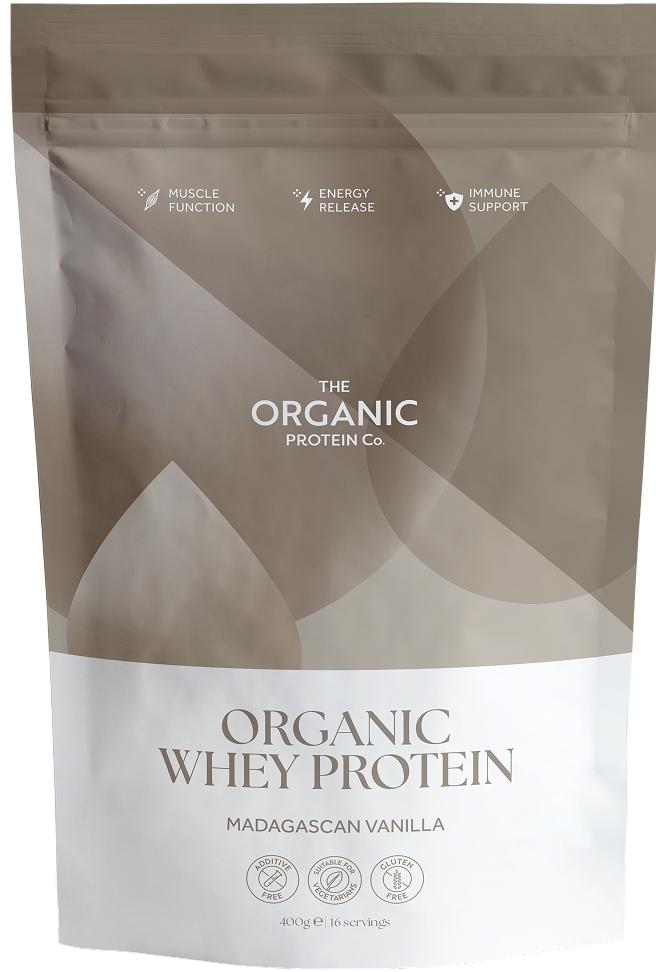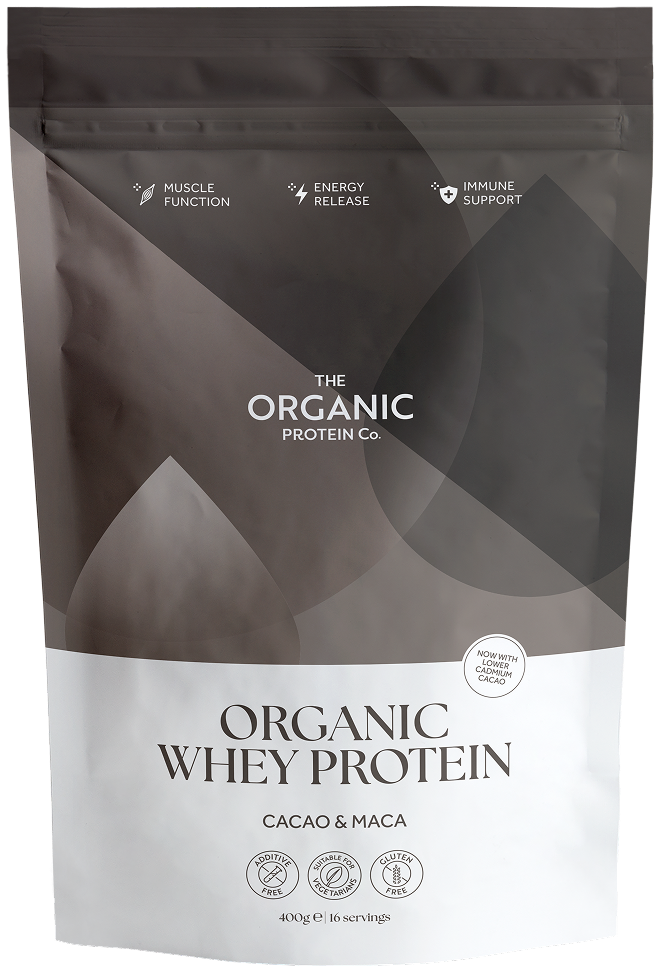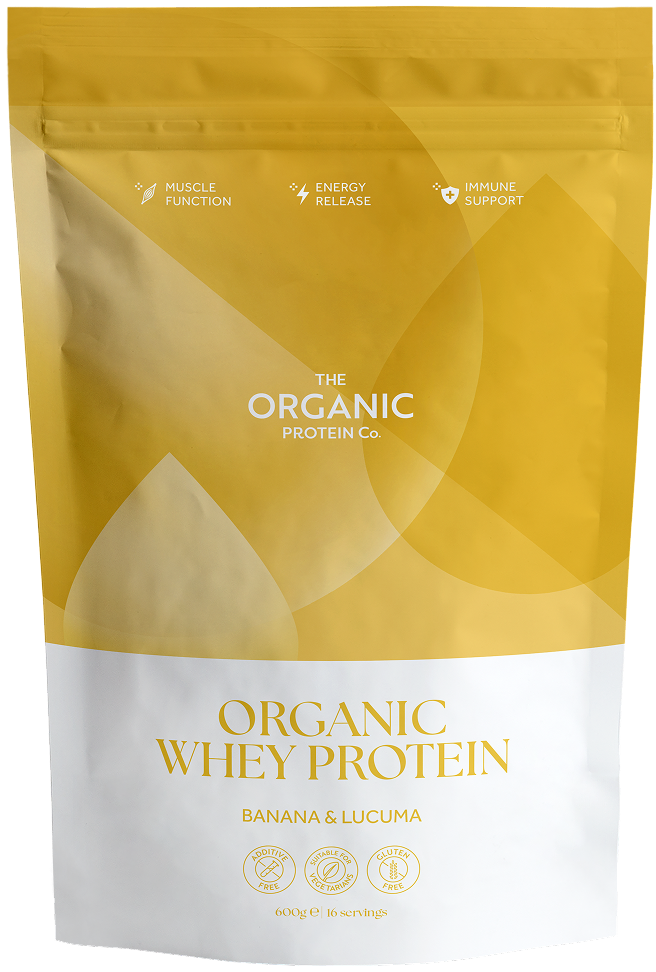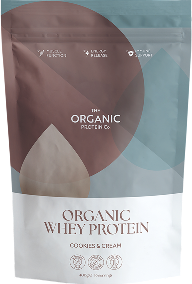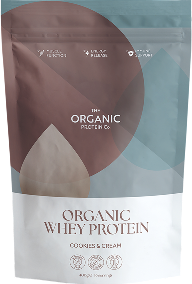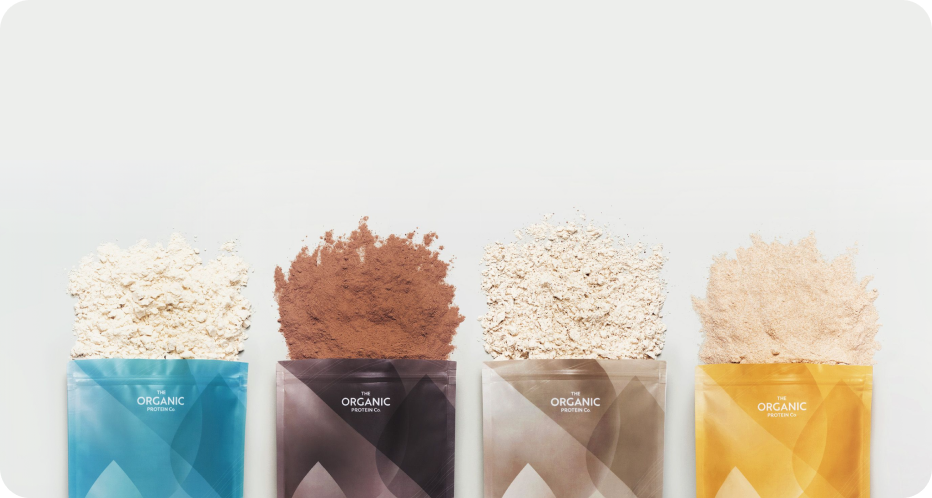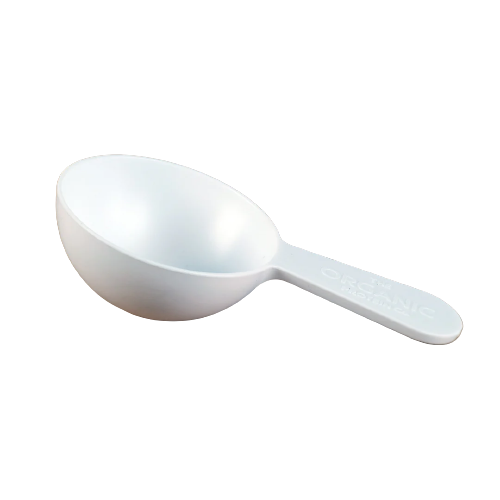The protein powder industry has taken off in recent years, with the whey protein powder market in particular projected to grow to over 40 billion U.S. dollars in value by 2032.
The appeal of protein powders is their versatile benefits. You might think that protein powders are only for those who want extra protein, but in fact, they can offer a simple way to keep your regular protein intake in check.
We understand that choosing the best protein powder for your needs can be overwhelming. Explore our guides below to find out more about this topic, with helpful tips and guidance on what to consider to find the best protein powder for you.
What are the common types of protein powder?
Before we begin, it’s helpful to understand exactly what the different types of protein powder on offer are. This way, you can be clear on some of the options you’re choosing between.
Dairy or animal-derived protein powders
Whey protein powder
One of the most widely used protein supplements, whey protein powder is in most cases a by-product of the cheese-making process. It’s normally derived from cow’s milk which is separated with enzymes, splitting into curds, which are used to make cheeses, and liquid whey. It’s then processed into one of three forms: concentrate, isolate or hydrolysate.
Whey protein is one of the most bioavailable proteins available and is the same protein that is found in human breast milk. It’s what’s known as a ‘complete protein’ - this means it contains all 9 essential amino acids and all 3 branched-chain amino acids (BCAAs), as well as helping to boost glutathione levels in the body.
It also contains bioactive proteins and antibodies such as Lactoferrin and Immunoglobulin G (IgG), as long as it remains undenatured by avoiding excessively high temperatures and acidity.

Casein protein powder
Casein protein, like whey protein, is found in cow’s milk; but, in contrast, it’s found in the curds that result from the cheese-making process. Casein makes up 80% of the total protein found in cow’s milk.
Similar to whey protein, it’s a complete protein with all 9 of your essential amino acids. It does, however, take longer for our bodies to digest casein in comparison to whey protein - studies in the past have shown that this is because casein forms a gel in your stomach once consumed.
Egg white protein powder
Eggs are a well-known source of high-quality, vegetarian protein. They contain all 9 essential amino acids, making them a complete protein source. When separated into egg whites and egg yolk, egg whites will typically contain slightly more protein.
This marginally higher protein content, along with the fact that the yolk is where most of the fat content is found, makes egg whites the more suitable option for a protein powder. When it comes to digestibility, egg white protein powder is a good option for those who are lactose intolerant.
Plant-based protein powders
Soy protein powder
Soy protein powder is a plant-based source of protein. It’s made when soybeans are dehulled, flaked and defatted, washed in either alcohol or water (removing the sugars and fibre), followed by a further alkali extraction process typically involving hydrochloric acid, sodium hydroxide, potassium hydroxide and hydrogen peroxide. It’s then dehydrated and powdered.
Soy protein is another complete source of protein, offering all 9 essential amino acids in good amounts.

Pea protein powder
Pea protein powder is made from ground yellow peas and typically follows the same protein extraction process as soy protein, with hydrochloric acid, sodium hydroxide, potassium hydroxide and hydrogen peroxide as part of the alkali solution used to achieve a higher maximum protein content.
While pea protein powder does contain all 9 essential amino acids, it is low in methionine. Because of this, people who use pea protein powder might choose to supplement it with other foods that are rich in methionine, such as fish or brown rice.
Research has shown that pea protein is a highly digestible plant-based protein, surpassed only by soy protein and chickpeas, though it still lags behind whey protein and other dairy protein sources.
Rice protein powder
As the name suggests, rice protein powder is extracted from rice - typically brown rice, which offers slightly more protein than white rice. It’s made by grinding and milling rice grains and then, as with pea, soya and other plant-based proteins with at least 70% protein, the rice powder undergoes an alkali extraction process. Once the protein has been extracted, it is dried through techniques such as spray drying or drum drying, and packaged.
Though a popular option, brown rice protein powder isn’t a complete protein as it lacks in lysine, which would need to be supplemented elsewhere in your diet. It is, though, often a good option for those with lactose intolerance or allergies, being dairy-free, gluten-free and soy-free.

Hemp protein powder
Hemp protein powder is typically made by pressing the oil from hemp seeds and then grinding the remaining hemp seed material into a fine powder. It’s entirely derived from plants and is therefore suitable for vegans, just like soy protein and pea protein.
While information about the quantities varies, hemp does contain all 9 essential amino acids. It is normally a less processed form of plant-based protein, though it is lower in protein per serving than soy or pea protein.
There do exist versions of hemp protein made using the same chemical extraction process used to make pea, soya, and rice protein. This is the case for almost any plant-based protein powder containing at least 70% protein, including 70%+ hemp proteins.
Most hemp protein powders contain around 50% protein, however, and these are made using purely mechanical processing without the use of any chemicals.
Pumpkin seed protein powder
Pumpkin seed protein powder is an option that’s growing in popularity as the demand for plant-based protein supplements grows. Similar to hemp protein, pumpkin seeds are cold-pressed, removing the oil, and are then milled to give a fine powder.
Pumpkin seed protein powder is low in the essential amino acids threonine and lysine and is therefore not considered a complete protein.

Sunflower seed protein powder
Protein powder derived from sunflower seeds is another increasingly popular type of protein powder. The processing methods are similar to pumpkin seed and hemp protein powders, with the oil being extracted from the seeds and the defatted seed meal milled into a fine powder.
Sunflower seed protein powders offer all 9 essential amino acids in their amino acid profile but are low in lysine, which can be supplemented from another source.
Vegan protein blends
Another plant-based option is vegan protein blends, which are often mixed together to improve the balance of amino acids.
A popular blend is rice and pea protein, as pea protein is low in the essential amino acids methionine and cysteine, unlike rice protein which has good levels of these amino acids. Rice protein, on the other hand, is lower in lysine, which can be brought back into balance by the pea protein.
Hemp protein and pumpkin protein, sunflower protein, and even algae are often also added, and though they don’t tend to contribute much to the amino acid balance, it’s nevertheless beneficial to have a variety of plant-based protein sources if you decide to go down that route.

What is the best protein powder for me?
Choosing from the vast range of protein powders on the shelves requires some consideration of your individual needs. What’s right for you might not be right for your friend, or their friend, and so on.
Below, you’ll find some helpful guides to give you more information about how to choose the best protein powder for your optimal health.
Navigation
Health and Wellbeing: For those seeking optimal health and wellbeing.
Seniors: For those maintaining or increasing protein intake in later life.
Vegetarians: For those seeking vegetarian sources of protein.
Men or Women: For those seeking protein tailored to gender-specific needs.
Ethics: For those committed to environmental and ethical standards in their nutrition choices.
Digestion: For individuals who bloat easily or just have sensitive tummies.
Weight Management: For anyone looking to manage, increase or reduce weight with supportive nutritional choices.
Immune Support: For those aiming to strengthen their immune system through targeted nutrition.
Natural Ingredients: For the health-conscious seeking clean, natural nutrition without additives.
Best protein powder for health and wellbeing
Many of us opt to take protein powder simply to up our protein intake or to ease the journey to a balanced diet amid a busy schedule. Some factors to consider in these cases are:
-
Nutritional profile: Protein powders which offer a balanced blend of macro and micronutrients, such as vitamins and minerals.
-
Protein bioavailability: How readily your body can digest and absorb the protein you consume is key to reaping its nutritional benefits for your health and wellness.
- Natural ingredients: Protein powders with natural ingredients and minimal additives to avoid unnecessary preservatives, fillers or artificial sweeteners.
Best protein powder for seniors
Protein powder can be a helpful healthy supplement in later life just as in our earlier years. As our muscle mass naturally declines with age, it is just as important, if not more so, to maintain protein intake to support healthy muscles.
With almost half of older adults getting less than their recommended protein intake, the best protein powder for seniors will include:
-
Balanced protein and calories: Protein powders which are high in protein yet low in calories to manage energy intake efficiently.
-
Bone health support: Protein plays a role in bone health as well as muscle health. Protein powders that contain calcium and vitamin D can also be beneficial for seniors.
- Digestive comfort: Protein powders which are easy to digest and gentle on the stomach, avoiding discomfort or bloating.
Best protein powder for vegetarians
Vegetarian diets offer numerous health benefits, yet ensuring adequate protein intake can sometimes be a challenge. Thankfully, there are lots of protein powders out there that can supplement your dietary choices.
-
Plant-based proteins: Plant-based protein powders are not just vegetarian but vegan, which are suitable if you’re aiming to move away from dairy too.
-
Complete protein sources: Protein powders which include all your essential amino acids ensure that you’re getting all the building blocks your body isn’t able to produce and relies on dietary sources for. These are vital for muscle health.
- Ethical alignment: As a vegetarian, you may have concerns about the ethical and sustainability implications of the food you eat. Look out for protein powders that align with these values.
Best protein powder for men or women
It’s commonly asked whether there is a ‘best protein powder’ for men or women. However, this can depend on a number of factors which can cross over and be important for both:
-
Health goals: What are your health goals and why are you choosing to increase your protein intake with protein powder? This can inform the type of protein powder you opt for.
-
Flavour and texture: Beyond the performance of your protein powder, it’s important that you enjoy consuming it. For both men and women, the best protein powder is one that you like the taste and texture of, whether that’s chocolate, vanilla or an unflavoured option.
- Ingredients: Depending on your individual health needs, protein powders which have additional ingredients can contribute to goals for men and women - for example, beneficial vitamins or ingredients that support weight management. You might be looking for the “cleanest” option, with the fewest number of ingredients possible.
Best protein powder for ethics
Ethical considerations are increasingly guiding our purchases, including the selection of protein powders, so it’s helpful to know what to look out for.
Some protein powder manufacturers are particularly adept at hiding the reality of their processing methods and ingredients list. Look out for:
-
Organic certification: An organic-certified protein powder offers assurance that the products have been sourced and produced with higher ethical standards.
-
Transparent practices: Clear, transparent practices - such as sharing information about ingredient sourcing and production methods - are crucial.
- Sustainability: Some protein powders can be less taxing on our planet than others, reducing their environmental impact.
Best protein powder for digestion
Digestive ease can be an important consideration when selecting the best protein powder for your needs, impacting its effectiveness in achieving your goals and how you feel after consuming it. Some factors to consider include:
-
Protein Digestibility Corrected Amino Acid Score (PDCAAS): Used since 1989, PDCAAS is a measurement that tells us how well our bodies can break down proteins and use them in the body after digestion and absorption.
- Allergens: Some protein powders won’t be suitable for those with certain allergies or digestive sensitivities, such as soy or dairy, as they may cause digestive issues.
Best protein powder for weight management
Managing weight can be supported with the right protein powder. For weight loss, protein can have positive effects on satiety and metabolism. For weight gain, protein powders can help to boost calories. Look out for the below:
-
Protein content: Consider a protein powder with high protein content per serving. This can be key in appetite control, helping you feel fuller for longer and reducing the likelihood of snacking.
-
Versatile uses: A protein powder that is easy to mix into a quick protein shake, or add to meals without altering the taste too significantly, can make incorporating it into your diet for weight management far easier.
- Ingredients: For weight management, keep an eye out for protein powders with added sugars which can result in blood sugar spikes and gradual weight gain.
Best protein powder for immune support
Protein, as well as helping to support and maintain muscles, plays an important role in your body’s immune response as amino acids are vital to the synthesis of immunity proteins. When choosing a protein powder that is best for immune support, consider the following:
-
Protein source: A protein powder with a high-quality protein source and high protein content per serving can ensure you get the right amino acids in every shake.
- Ingredients: For flavoured options, added natural ingredients can support the role of protein in immune support, offering additional nutritional benefits from vitamins and minerals.
Best protein powder for natural ingredients
For those committed to natural nutrition, selecting a protein powder that is free from any dubious ingredients is essential. There are certain things to look out for when seeking out the most natural protein powder on the shelves:
-
Artificial ingredients: A protein powder with no artificial ingredients such as sweeteners or emulsifiers will offer all the benefits of protein without the nasties.
-
Wholefood sources: Look out for protein powders which use clean wholefood ingredients to add flavours, avoiding artificial or “natural” flavourings.
- Organic certification: Protein powders with organic certification will help ensure that what you’re consuming has been sourced and processed to higher standards, with non-GMO ingredients and avoiding pesticides.

Final thoughts on selecting the best protein powder for you
The world of protein powders is diverse and the importance of selecting a product that aligns with your individual health goals, dietary requirements and personal values cannot be overstated.
Whether you’re focused on enhancing your overall health and wellness, addressing a specific diet or supporting ethical practices, your journey to the best protein powder for you is unique. Our aim is to provide you with the knowledge and tools needed to make informed decisions that reflect your personal health goals.
We encourage you to explore and find out more about how different protein powders can align with your needs and lifestyle. By taking the time to understand which protein powder is best for you, you can ensure your daily protein shake is working effectively for you and your body.

